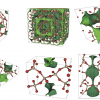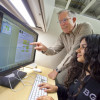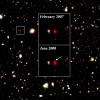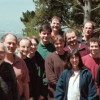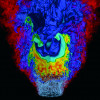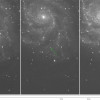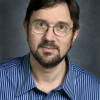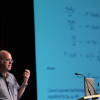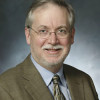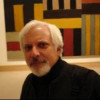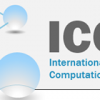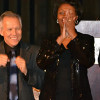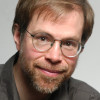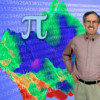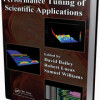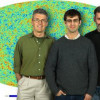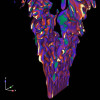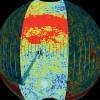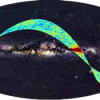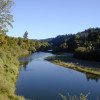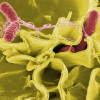News Center
Computing Tools Speed Search for New Porous Materials
A team of Berkeley Lab and the UC Berkeley researchers are speeding the search for new porous materials through computation. Read More »
Experimental Mathematics: Computing Power Leads to Insights
Modern computer technology has vastly expanded our ability to discover new mathematical results. Read More »
Distant Supernovae Reveal 10 Billion Year-old Secret
Type Ia supernova were five times more frequent in the early universe than today, found astronomers who exposed the largest sample of distant supernovae ever found. Many of the 150 events are 10 billion light years distant from Earth. Read More »
Nobel Laureate a Computational Cosmology Pioneer
Winner of the 2011 Nobel Prize in Physics, Saul Perlmutter leads a research team believed to be the first to use supercomputers to analyze and validate observational data in cosmology. Read More »
Co-Designing Exascale Architectures and Algorithms for Real-World Combustion Simulations
In a five-year project recently announced by the Department of Energy, the Combustion Exascale Co-Design Center will combine the talents of combustion scientists, mathematicians, computer scientists, and hardware architects. This multidisciplinary team will work to simultaneously redesign each aspect of the combustion simulation process—from algorithms to programming models to hardware architecture—in order to create high fidelity combustion simulations that can run at the next level of supercomputing power, the exascale. Read More »
Supernova Caught in the Act
Astronomers believe they caught a nearby supernova within hours of its explosion, a rare feat made possible by a specialized survey telescope and state-of-the-art computational tools. Read More »
Vern Paxson Honored
Vern Paxson of Berkeley Lab’s Computational Research Division has been named recipient of this year’s ACM SIGCOMM Award. Read More »
CRD Researchers Receive Prizes, Present at ICIAM 2011
At the 7th International Congress on Industrial and Applied Mathematics, two of Berkeley Lab’s leading mathematicians received prizes for their research contributions. Many others gave talks, presented papers and posters, and organized technical sessions. Read More »
David L. Brown New CRD Director
David L. Brown is the new director for the Computational Research Division (CRD), as of Aug. 30. Brown comes to Berkeley Lab from LLNL. Read More »
David Leinweber Named One of Top 10 Innovators of Decade in Trading Industry
David Leinweber of the Computational Research Division has been named by Advanced Trading magazine as one of its "Top 10 Innovators of the Decade." Read More »
ICCS Members Collaborate on Award-Winning Paper
One year after Lawrence Berkeley National Laboratory and UC Berkeley established the International Center for Computational Science (ICCS) with partners at the University of Heidelberg in Germany and the National Astronomical Observatories of the Chinese Academy of Sciences in China, the first research paper submitted by ICCS-affiliated researchers will be honored with the PRACE Award. The award, sponsored by the Partnership for Advanced Computing in Europe (PRACE), will be presented to… Read More »
Juan Meza Named New Dean of Natural Sciences at UC Merced
Juan Meza, acting director of the Computational Research Division and head of CRD’s High Performance Computing Research Department, has been named Dean of the School of Natural Sciences at UC Merced. The appointment, announced Friday, June 3, will be effective this fall. "As I was considering this position, I was truly impressed by the quality of the faculty, the commitment and diversity of UC Merced's students and the great potential to help shape the development of the newest campus in one… Read More »
Search Engine Speeds Past Competition
Berkeley Lab's open source FastBit can search massive databases 10 to 100 times faster than large commercial database software. Read More »
James Demmel Elected to National Academy of Sciences
James W. Demmel, a UCB professor and CRD researcher, is one of 72 new members elected to the National Academy of Sciences (NAS). Read More »
Supercomputer Cracks "Impossible" Calculation
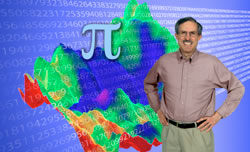 David Bailey
Australian researchers have done the impossible—they’ve found the sixty-trillionth binary digit of Pi-squared! The calculation would have taken a single computer processor unit (CPU) 1,500 years to calculate, but scientists from IBM and the University of Newcastle managed to complete this work in just a few… Read More »
David Bailey
Australian researchers have done the impossible—they’ve found the sixty-trillionth binary digit of Pi-squared! The calculation would have taken a single computer processor unit (CPU) 1,500 years to calculate, but scientists from IBM and the University of Newcastle managed to complete this work in just a few… Read More »
Performance Tuning of Scientific Applications
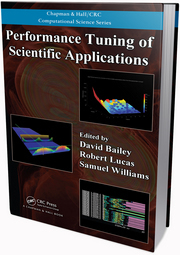 David Bailey and Samuel Williams of the Lawrence Berkeley National Laboratory’s Computational Research Division (CRD) recently published a book called, Performance Tuning of Scientific Applications, which presents current research in performance analysis from some of the most notable experts in the… Read More »
David Bailey and Samuel Williams of the Lawrence Berkeley National Laboratory’s Computational Research Division (CRD) recently published a book called, Performance Tuning of Scientific Applications, which presents current research in performance analysis from some of the most notable experts in the… Read More »
Two Berkeley Lab Researchers Named 2011 Sloan Fellows
Two researchers from the Lawrence Berkeley National Laboratory’s Computational Research Division have been awarded the prestigious Sloan Research Fellowship, given annually by the Alfred P. Sloan Foundation to scientists, mathematicians and economists who are at an early stage of their research careers. The awardees will receive a $50,000 grant over the next two years to pursue any line of research they choose. The new fellows from Berkeley Lab are: Per-Olof Persson, CRD Mathematics Group… Read More »
A Clearer Picture of Carbon Sequestration
 Fossil fuel-fired power plants, such as this coal-fired one, are major sources of CO2 emissions, the main culprit in manmade climate change.
Despite progress in clean energy, Americans will continue to rely on fossil fuels for years to come. In fact, coal-, oil- and natural gas-fired power… Read More »
Fossil fuel-fired power plants, such as this coal-fired one, are major sources of CO2 emissions, the main culprit in manmade climate change.
Despite progress in clean energy, Americans will continue to rely on fossil fuels for years to come. In fact, coal-, oil- and natural gas-fired power… Read More »
Berkeley Lab Team Receives NASA Public Service Group Achievement Award
Three scientists from the Lawrence Berkeley National Laboratory’s (Berkeley Lab) Computational Cosmology Center (C3) are being honored with a NASA Public Service Group Award for developing the supercomputing infrastructure for the U.S. Planck Team’s data and analysis operations at the Department of Energy's National Energy Research Scientific Computing Center (NERSC). The award will be presented to current C3 members Julian Borrill, Christopher Cantalupo and Theodore Kisner, as well as… Read More »
Restoring Carbon Balance
CRD researchers received more than 18 million supercomputing hours through the 2010 Innovative and Novel Computational Impact on Theory and Experiment (INCITE) program to conduct experiments and run simulations exploring the viability of carbon-neutral technologies, like nano solar cells and near-zero emission combustion devices. Read More »
Madly Mapping the Universe
It takes special software to map the universe from noisy data. Berkeley Lab scientists developed a code called MADmap to do just that for the cosmic microwave background, then posted it on the web for other interested sky mappers. Scientists probing the sky with the PACS instrument aboard the Herschel satellite have adapted MADmap to make spectacular images of the infrared universe. Read More »
Tradition of Cosmic Microwave Background Data Analysis Continues with Planck
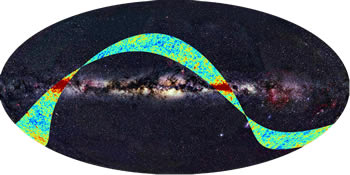 One of Planck's first images is shown as a strip superimposed over a two-dimensional projection of the whole sky as seen in visible light. Image credit: ESA, LFI & HFI Consortia; background optical image: Axel Mellinger
More than 95 percent of our universe is made up of mysteriously "dark" materials—approximately 22 percent of it is… Read More »
One of Planck's first images is shown as a strip superimposed over a two-dimensional projection of the whole sky as seen in visible light. Image credit: ESA, LFI & HFI Consortia; background optical image: Axel Mellinger
More than 95 percent of our universe is made up of mysteriously "dark" materials—approximately 22 percent of it is… Read More »
Berkeley Lab Checkpoint Restart Saves Big Problems
A combustion researcher may run hundreds of hours of simulations on a supercomputer in search of the most efficient fuel-air mixture for a flame. But if the system crashes, then all the data from the run might be lost and the researchers forced to start over The new version Berkeley Lab Checkpoint Restart (BCLR) software, released in January 2009, could mean that scientists running extensive calculations will be able to recover from such a crash – if they are running on a Linux cluster. This… Read More »
New Tools for Sharing Wealth of Data to Study Global Resources Issues
As they strive to develop effective strategies for guarding water supplies, protecting endangered species and curbing greenhouse gases, environmental scientists are turning to innovative cyber-infrastructures and data-mining tools developed by an ongoing collaboration between researchers at Lawrence Berkeley National Laboratory, Microsoft Research, and the University of California, Berkeley. The Microsoft e-Science program is the primary funder of this project, which is one of numerous ventures… Read More »
Integrated Microbial Genomics Reaches Out to Include Human Microbial Communities
We live in a microbial world,” says Nikos Kyrpides of Berkeley Lab’s Genomics Division. “There are millions of organisms in one drop of water and even more in soil. Life on our planet cannot be sustained without the microbes.” However, only a tiny fraction of microbes live as independent species, and even fewer of these can be cultured in the laboratory. The vast majority of bacteria and other microorganisms exist only in the wild, and in complex communities. The collective genome… Read More »









